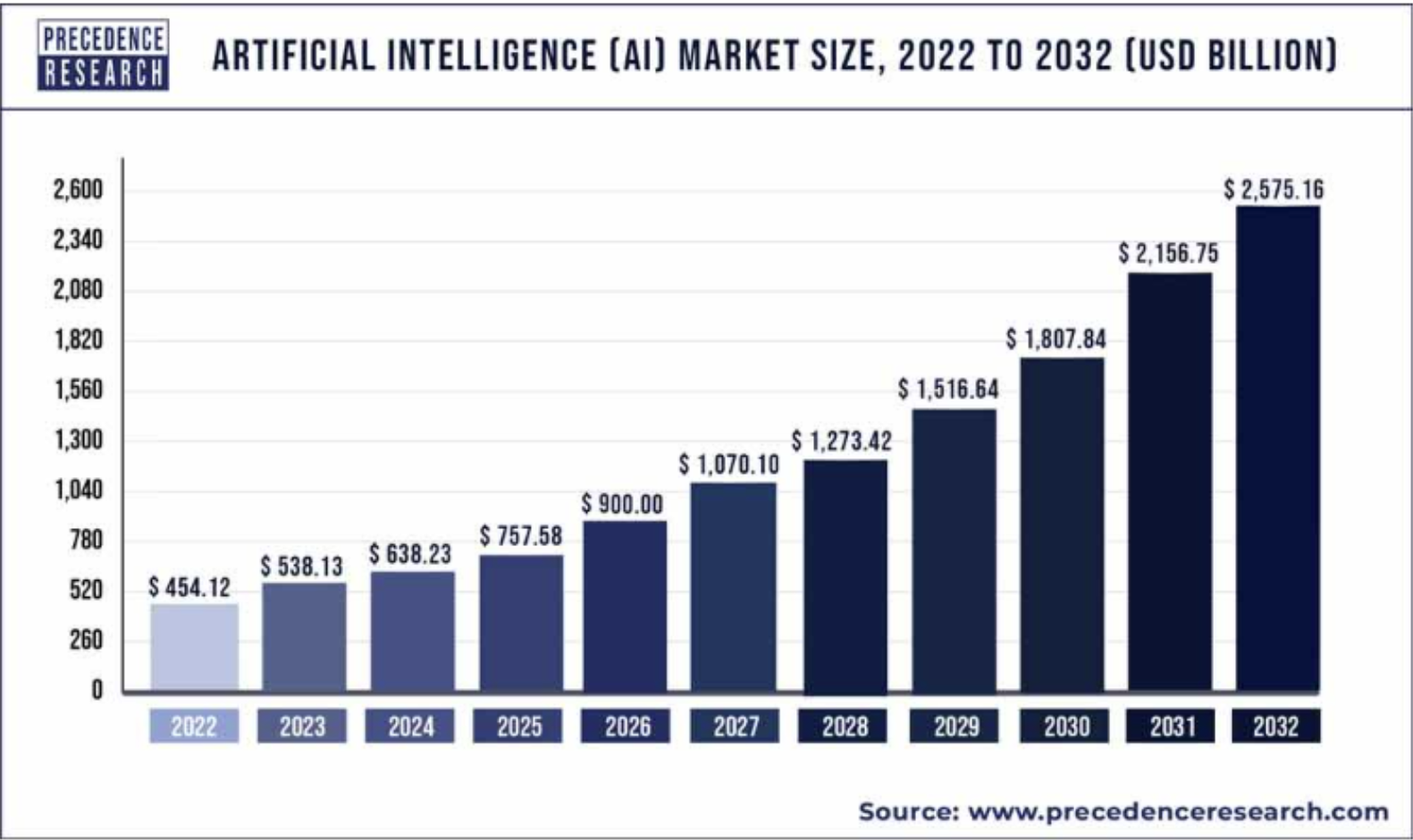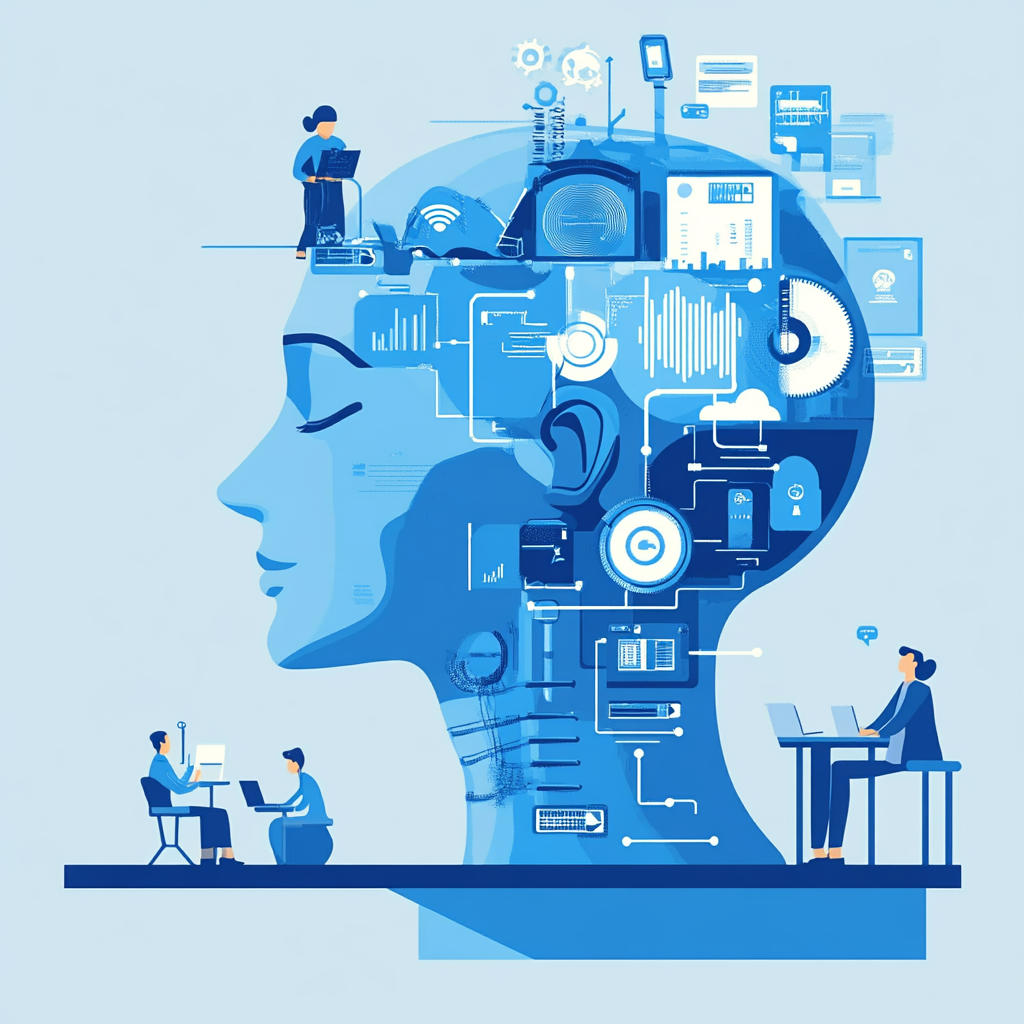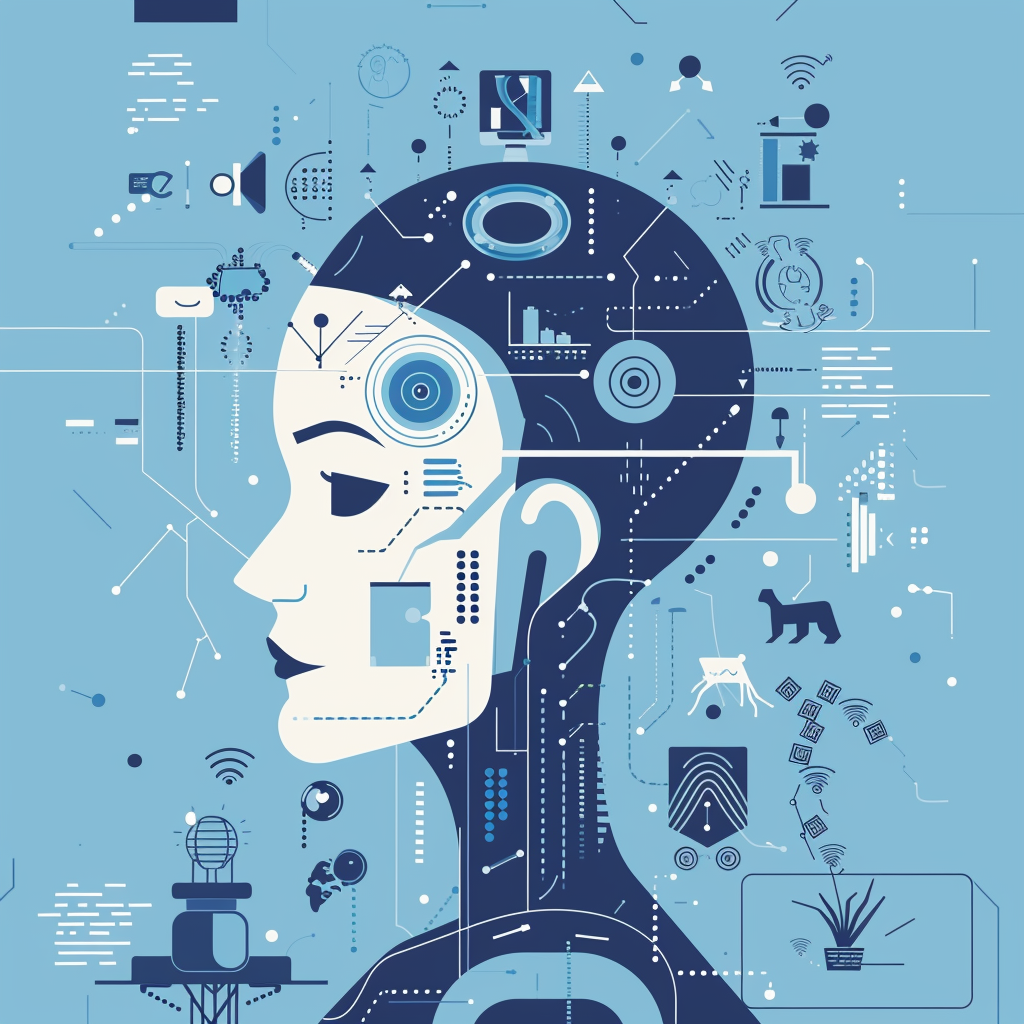The business landscape is no stranger to disruption. But the current wave, powered by Artificial Intelligence (AI), is unlike anything we’ve seen before. It’s not just about automating tasks. It’s about fundamentally transforming how businesses operate, interact with customers, and make decisions. Are you ready to harness this transformative power? This article equips you with the insights and AI business ideas to make artificial intelligence the cornerstone of your next business venture.
AI in the Modern Business Landscape
The global artificial intelligence market was valued at USD 196.63 billion in 2023, with projections indicating a compound annual growth rate (CAGR) of 37.3% from 2023 to 2030. This remarkable growth is attributed to ongoing research and innovation led by tech giants, fueling the adoption of advanced technologies across various industry verticals.

For instance, in December 2023, Google LLC unveiled ‘Gemini’, a groundbreaking large language AI model. This innovative model, available in three variants – Gemini Nano, Gemini Pro, and Gemini Ultra, sets itself apart from competitors with its inherent multimodal capabilities.
AI’s influence spans diverse industries, including finance, healthcare, retail, and manufacturing. In finance, AI algorithms analyze real-time market trends, empowering traders to make swift decisions and optimize investment portfolios. Similarly, in healthcare, AI-powered diagnostic tools assist physicians in accurately identifying diseases and offering personalized treatment recommendations.
AI also enhances the customer experience in an automated online business by providing personalized content and product recommendations. For instance, AI-driven chatbots provide round-the-clock customer support, enhancing response times and customer satisfaction. In manufacturing, predictive maintenance systems powered by AI monitor equipment health, minimizing downtime and maximizing productivity.
Why Launch an AI Business in 2025?
The window of opportunity for AI entrepreneurs has never been wider. Here’s why launching your AI business in 2025 is a strategic masterstroke.

6 Reasons to Launch an AI Business in 2025
- Become an early adopter. With the market still evolving, there’s a golden opportunity to establish yourself as a leader and carve out a niche in this high-growth industry. Early movers will benefit from brand recognition, customer loyalty, and the ability to shape the future of AI solutions.
- Boost efficiency and productivity. AI’s ability to automate repetitive tasks goes beyond simply saving time. It frees up your valuable human workforce to focus on higher-order cognitive functions like creative problem-solving, strategic planning, and building stronger customer relationships. This shift can lead to a significant competitive advantage by enabling faster innovation, improved decision-making, and a more agile approach to market changes.
- Hyper-personalization. Customers today crave experiences tailored to their specific needs and preferences. AI offers the key to unlocking this level of personalization. By analyzing vast amounts of customer data, AI can power targeted marketing campaigns, recommend relevant products and services, and deliver truly personalized experiences that foster deeper customer loyalty and higher satisfaction rates.
- Data-driven decision-making. Modern businesses are drowning in data. AI acts as a mighty life raft, empowering you to analyze vast datasets and uncover hidden trends, patterns, and insights. This allows you to make data-driven decisions that are more informed, strategic, and, ultimately, more likely to drive sustainable business growth. Imagine predicting customer churn before it happens, optimizing inventory management, or identifying untapped market opportunities—all made possible with the power of AI-driven data analysis.
- Reduced operational costs. It’s a common fact that AI streamlines operations by automating repetitive tasks, reducing human error, and optimizing workflows. This translates to significant cost savings across various business functions. For example, AI-powered chatbots can handle customer service inquiries at a fraction of the cost of human representatives. Additionally, AI can predict equipment failures and schedule preventive maintenance, minimizing downtime and associated costs. These cost savings can be reinvested into further innovation and growth, fueling a virtuous cycle of success.
Top AI Business Ideas
1. Powered Healthcare Solutions
Recent advancements in healthcare AI solutions focus on developing algorithms that can accurately diagnose diseases, customize treatment plans, and simplify administrative tasks. Integrating AI with wearable devices allows for continuous health monitoring, while NLP improves patient-doctor communication. Recent advancements also involve the implementation of federated learning to protect patient confidentiality during the training of AI models across various institutions and the creation of AI-driven robotic assistants for surgical procedures, which improve accuracy and expedite recovery periods.
2. Autonomous Vehicles
Navigation, safety, and predictive maintenance are three areas where autonomous vehicles have recently made strides, with a focus on AI-driven solutions. Artificial intelligence combined with 5G networks improves connection and real-time data interchange, while techniques like reinforcement learning increase decision-making in complicated driving situations. State-of-the-art studies are investigating how to combine artificial intelligence with blockchain technology to make autonomous car systems more trustworthy and secure so they can withstand cyberattacks and communicate safely with one another.
3. AI-Powered Financial Advisory Services
Currently, AI-powered platforms offer individual investors tailored investment strategies, financial advice, and risk assessment. Machine learning algorithms aid in fraud detection. At the same time, AI chatbots provide round-the-clock client care and financial guidance. The integration of ethical considerations into financial decision-making processes is propelled by emerging AI trends, such as the application of artificial intelligence in ESG (Environmental, Social, and Governance) investing, in which algorithms analyze large datasets to identify sustainable investment opportunities that align with investors’ values.

4. Smart Retail Solutions
Improved inventory management, customer service, and checkout processes are just a few examples of how artificial intelligence is changing the retail industry. Aside from cashier-less stores, new technologies use computer vision to monitor shelves in real-time, which allows for precise inventory management and refilling. Natural language processing capabilities are also being added to AI-powered chatbots to offer more intuitive virtual shopping assistance tailored to the individual’s needs. These chatbots can examine customers’ tastes and past purchases to improve the shopping experience and provide personalized product suggestions.
5. AI-Powered Cybersecurity
Cybersecurity professionals increasingly turn to AI for threat detection and deception strategies. By using virtual decoys within networks, AI-driven deception technology can divert attackers’ attention away from vital assets, giving security teams more time to detect and eliminate dangers. Additionally, a strong defense against potential hazards posed by quantum computing is the rise of quantum-resistant cryptography, which is supported by AI algorithms. Even as technology evolves at a dizzying pace, this fresh method keeps private information safe.
6. Virtual Assistants for Business
With the addition of sophisticated skills like adaptive learning and emotional intelligence, virtual assistants are rapidly developing into all-encompassing digital partners for companies. These AI-powered virtual assistants of the future can read their users’ emotions and react accordingly, offering sympathetic support and tailored guidance. Furthermore, they make use of reinforcement learning strategies to enhance their performance and adjust to evolving business landscapes. Secure internal communications and transactions are made possible by integrating virtual assistants with blockchain technology, which guarantees the anonymity of data.
7. AI-Based Content Creation
The use of artificial intelligence to generate original material is booming, thanks to new algorithms that boost productivity and innovation. Researchers are delving into transformer models like GPT (Generative Pre-trained Transformer) as well as GANs and NLG to generate diverse and contextually rich material. These models are very good at generating high-quality text and audio and video synthesis. Furthermore, AI-powered platforms for content creation are incorporating user feedback systems to continuously enhance the quality of produced material, guaranteeing that it consistently satisfies changing standards and preferences.
8. Predictive Maintenance Solutions
With each new version, predictive maintenance solutions provide more profound information and the ability to intervene proactively. In addition to more conventional forms of predictive analytics, AI systems are increasingly using cutting-edge methods, such as deep learning, to spot tiny trends that can indicate equipment failure. Predictive maintenance systems also use edge computing to assess sensor data in real-time, allowing for immediate reactions to anomalies. Virtual simulations can optimize maintenance schedules and accurately anticipate equipment performance by integrating predictive maintenance and digital twin technology.
9. AI-Driven Agricultural Solutions
Agricultural solutions driven by artificial intelligence are continuously getting smarter, using a mix of data sources and innovation to boost sustainability and production on farms. The use of hyperspectral imaging and LiDAR technology, along with drones and satellite photography, allows for collecting detailed data on soil composition and crop health. After applying AI algorithms to this data, farmers are provided with practical recommendations to enhance planting techniques and resource allocation. In addition, agricultural supply chains are using blockchain technology, which allows for transparent and verifiable transactions and guarantees farmers fair pay.

10. Personalized Learning Platforms
Educational platforms powered by AI have come a long way in catering to students’ varied requirements. In addition to taking into account variables like speed, competency, and preferred learning modalities, these platforms now use complex adaptive learning algorithms to tailor information to individual learning styles. Teachers can see where their students are struggling and where they need more help by using big data analytics to keep tabs on their progress. Utilizing natural language processing (NLP), AI tutors have progressed to the point where they can engage in meaningful conversations with pupils, resolving misconceptions and offering customized instruction in real-time, going above and beyond the scope of simple tests to provide individualized feedback. For a more well-rounded and tailored education, we also use collaborative filtering algorithms to suggest further reading and study tools according to each student’s unique interests and goals.
11. AI-Powered Energy Management
Artificial intelligence has become an indispensable tool for managing energy usage and speeding up the adoption of renewable power sources. The use of artificial intelligence in energy management systems allows for the accurate monitoring and control of energy use in different industries by analyzing real-time data from smart grids and Internet of Things (IoT) sensors. These systems maximize resource allocation by using predictive analytics to correctly forecast demand patterns, enabling energy suppliers to make real-time supply adjustments. Furthermore, predictive maintenance algorithms powered by AI aid in avoiding expensive equipment breakdowns by spotting any problems in advance, which improves system reliability and decreases downtime. Additionally, existing networks are optimized for the integration of renewable energy sources like wind and solar using machine learning algorithms. This guarantees sustainable and efficient energy distribution with little environmental impact.
11. AI-Based Entertainment Platforms
New developments in artificial intelligence are changing the face of entertainment platforms. Aside from tailored content recommendations, these platforms increasingly utilize generative adversarial networks (GANs) to generate artificially realistic artwork, music, and even virtual actors, opening up new spaces for artistic expression. Modern developments in natural language processing also make it possible for these systems to track user actions and preferences, which lets them craft unique stories and provide more interactive storytelling. The combination of AR and VR technology provides users with even more engaging content experiences using immersive and interactive environments. Also, algorithms for sentiment analysis keep a constant eye on user reviews so that platforms can dynamically change content suggestions and user experiences to keep users happy and engaged.
How to Choose an AI Business Idea
Find a niche market
Don’t try to solve everything at once. Identify a specific industry or user group with a well-defined problem. This allows you to tailor your AI solution for maximum impact and build a strong reputation within that niche.
Consider the ethical implications
As AI becomes more powerful, ethical considerations become paramount. Think about potential biases in your data or algorithms and how your solution might impact people’s lives. Building trust and transparency are key in today’s AI landscape.
Embrace collaboration
Building a successful AI product often requires expertise beyond coding. Look for partners who complement your skill set, whether it’s data scientists, domain experts, or designers. LITSLINK, with its strong AI team and proven track record, can be your one-stop shop for bringing your AI vision to life.
Focus on continuous improvement
AI is an iterative process. Don’t expect to launch a perfect product on day one. Gather user feedback, monitor performance metrics, and be prepared to adapt and improve your solution over time.
Stay ahead of the curve
The field of AI is constantly evolving. Stay up-to-date on the latest advancements and research, and be prepared to integrate new technologies into your platform to stay competitive. Selecting the right AI business idea requires careful consideration of market demand, technological feasibility, and scalability. Conducting thorough market research to identify niche opportunities and assess the competition is essential. Additionally, leveraging the expertise of AI professionals, such as those at LITSLINK, can provide invaluable insights and technical support to bring your idea to fruition.
Conclusion: Turn Potential into Reality
The future belongs to businesses that harness the power of AI. The AI business ideas presented here serve as a starting point for your entrepreneurial endeavors, offering a glimpse into the boundless opportunities that AI innovation can unlock. However, the journey from concept to reality requires expertise and support.
At LITSLINK, we understand the pivotal role that AI plays in shaping the future of businesses across industries. Our comprehensive suite of AI development services spans from initial concept development to full-scale implementation, ensuring that your vision is brought to life with precision and efficiency.





